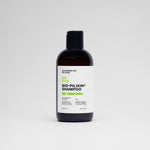As consumers become more conscious of the ingredients in their personal care products, the demand for sulfate-free shampoos has been on the rise. Sulfates, particularly sodium lauryl sulfate (SLS) and sodium laureth sulfate (SLES), are commonly used in shampoos as foaming agents and cleansers. However, these surfactants can strip the hair and scalp of natural oils, leading to dryness, irritation, and potential hair damage over time. While sulfate-free shampoos offer a gentler alternative, it's essential to be aware of other potentially harmful ingredients to avoid.
Table of content
What to avoid in sulfate-free shampoo?
While opting for sulfate-free shampoos is a step in the right direction, it's crucial to scrutinize the ingredient lists to avoid other potentially harmful or drying components. Some ingredients to watch out for in sulfate-free shampoos include parabens, silicones, synthetic fragrances, and certain harsh surfactants.
Parabens
Parabens are a group of preservatives commonly used in cosmetic products, including shampoos, to extend their shelf life. However, there are concerns about their potential endocrine-disrupting properties and their ability to mimic estrogen in the body. While the jury is still out on the long-term effects of parabens, many consumers prefer to avoid them as a precautionary measure.
Silicones
Silicones, such as dimethicone and cyclomethicone, are commonly used in shampoos and conditioners to provide smoothness, shine, and manageability. However, these synthetic ingredients can build up on the hair over time, weighing it down and making it appear dull and lifeless. Additionally, silicones can be challenging to remove from the hair, leading to product buildup and potential scalp irritation.
Synthetic Fragrances
Many conventional shampoos contain synthetic fragrances to mask the scent of other ingredients or to impart a specific fragrance. However, these fragrances can be derived from a cocktail of chemicals, some of which may cause irritation, allergic reactions, or other health concerns. Individuals with sensitive skin or allergies may benefit from avoiding synthetic fragrances and opting for shampoos with natural fragrances or no added fragrance.
Harsh Surfactants
While sulfate-free shampoos avoid SLS and SLES, some formulas may still contain other harsh surfactants that can be drying or irritating to the hair and scalp. Examples of surfactants to watch out for include ammonium lauryl sulfate, sodium coco-sulfate, and sodium C14-16 olefin sulfonate. These ingredients can still strip the hair of its natural oils and cause dryness and irritation, defeating the purpose of using a sulfate-free shampoo.
As your leading source for hair health information over the past 4 years, we never compromise on accuracy. When it comes to your health, you deserve information you can truly rely on - and earning your trust is our top priority.
Here's how Scandinavian Biolabs ensures every piece of content meets the highest standards of accuracy and integrity:
- Credentialed Experts: Our reviewers are actively practicing doctors and medical researchers
- Stringent Reviews: Content undergoes rigorous editing by subject specialists and review by a practicing doctor.
- Evidence-Based: We rely on well-established research from trusted scientific sources like peer-reviewed journals and health authorities.
- Full Transparency: Our editorial standards, writer credentials, reviewer credentials, correction process, and funding are all publicly documented.
- Independent Voice: While we do promote products, we operate in a vacuum to business operations. Our main goal is just an unwavering commitment to providing medically-sound guidance.
You can count on Scandinavian Biolabs to consistently deliver the trustworthy health information you deserve. Read our Editorial Standards.
Choosing a Gentle, Nourishing Sulfate-Free Shampoo
When selecting a sulfate-free shampoo, it's essential to look for nourishing, gentle formulas that avoid the potentially harmful ingredients mentioned above. Here are some tips to help you make an informed choice:
Read Ingredient Lists Carefully
Take the time to read and understand the ingredient lists on shampoo bottles. Look for products with simple, recognizable ingredients derived from natural sources, such as plant oils, extracts, and vitamins.
Opt for Paraben-Free and Silicone-Free Formulas
Many sulfate-free shampoo brands now offer paraben-free and silicone-free options, which can be a safer and gentler choice for your hair and scalp.
Choose Natural or No-Fragrance Options
If you have sensitive skin or prefer to avoid synthetic fragrances, look for sulfate-free shampoos that are either unscented or use natural fragrances derived from essential oils or plant extracts.
Consider Organic or Vegan Formulas
For an even more natural and eco-friendly option, consider sulfate-free shampoos that are certified organic or vegan. These products often use plant-based ingredients and avoid animal-derived components or synthetic additives.
Be Mindful of Concentration Levels
Even natural ingredients can be harsh or drying if used in high concentrations. Look for shampoos that use gentle, nourishing ingredients in appropriate concentrations to avoid potential irritation or damage.
Conclusion
While choosing a sulfate-free shampoo is a step in the right direction for healthier, gentler haircare, it's essential to be mindful of other potentially harmful ingredients to avoid. Parabens, silicones, synthetic fragrances, and harsh surfactants should be scrutinized and avoided whenever possible.
When selecting a sulfate-free shampoo, prioritize gentle, nourishing formulas with simple, recognizable ingredients derived from natural sources. Look for paraben-free, silicone-free, and fragrance-free options, and consider organic or vegan products for an even more natural and eco-friendly choice.
By being an informed consumer and making thoughtful choices, you can find a sulfate-free shampoo that effectively cleanses your hair without stripping it of its natural oils or exposing it to potentially harmful ingredients.
Ditch the Dryness!
Is your hair feeling dull, frizzy, or easily breaking? Harsh sulfates in your shampoo could be the culprit.
Scandinavian Biolabs Hair Strength Shampoo is a gentle, sulfate-free formula that cleanses without stripping your hair's natural oils. Made with nature-inspired ingredients, it helps:
- Reduce breakage for stronger, healthier hair
- Soothe your scalp and eliminate irritation
- Protect color-treated hair from fading
Experience the Scandinavian Biolabs difference!
Read more:






